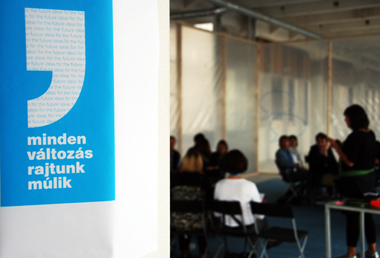A big empty factory still under renovation, surrounded by visible remnants of state Socialism was the venue of the Civil Society Forum. The conference gathered over 300 representatives in the Slovakian capital of Bratislava to discuss the challenges for civil society in contemporary Central and Eastern Europe. Orangelog followed the discussions and debates.
Twenty years after the fall of the Berlin Wall many politicians, sociologists and media have defined 2009 as a historic landmark. The common legacy of post-communist society in Central and Eastern Europe makes this symbolic anniversary an important opportunity to evaluate the state of art.
The rebuilding – not to say rebirth – of civil society and social capital has been at the top of the agenda of democratic development for all the states that lay on the other side of the former Iron Curtain in these twenty years. In 2009, the world seems once again at a turning point. The advent of new communication technologies, the new challenges of immigration, the enlargement of the European Union, climate change and the economic crises have consistently changed the landscape of Central and Eastern Europe. But as much as the world changes, we still need a critical (and self-critical) analysis of the situation of democracy and of the state of civil society.
Long-term legacy
The Trust for Civil Society in Central & Eastern Europe was launched in 2001 as an independent public charity organisation supported and financed by a group of private US foundations. The Trust was created as a mechanism for helping the transition between donors and independent, active and viable organisations in the countries. It will distribute 75 million USD by the end of 2012, when the initiative is meant to finish, leaving the legacy of a long-term sustainable development to the organisations being supported.
“Well after the half-way point of our term of life”, notes Ewa Blawdziewicz, Office Manager of the CEE Trust in Warsaw, “we have envisioned the Civil Society Forum as a sort of ‘evaluation in progress’ of the work conducted so far and as an opportunity to reflect on the challenges to be addressed in the next 20 years. Civil society remains a key aspect of democracy and we shouldn’t come unprepared to the future.”
Lonely citizens
Human beings are social creatures – not occasionally or by accident but always. Society is not just the product of its individual members, it is the product of the interconnections between its constituent groups. The aggregate relations among individuals and groups, and individuals within groups, and among groups form a network of astonishing complexity.
“Civil society is for society what blood is for a body: there is no life without blood circulation”, said former president of the Institute for Public Affairs Martin Butora, when asked for a definition of civil society.
It seems though that our societies are much better off than our bodies when it come to surviving without essential resources. Our society suffer today of huge falls of blood pressure, with a civil society constantly depicted in a period of crisis by many researchers and sociologists. Polish-British sociologist Zygmunt Bauman describes well the consequences of such a downfall: “In today’s individualistic society we create problems together, but we are supposed to solve them individually, deploying individual ingenuity, perceptiveness, energy and our own privately held means.”
In his famous book Bowling Alone, sociologist Robert Putnam illustrates the fall of social capital in contemporary USA, introducing the concept of “lonely citizens”. The decreasing number of memberships of NGOs, political parties and other social groups, combined with rising anti-political feelings complete the equation, determining a desolating picture of a weak and tired civil society.
Yawn! Is civil society tired?
Such a desolating picture might give leave little hope for the future of civil society, leading to endless frustration. But perhaps frustration can be considered as the very driving force of civil society. In the words of Michael Edwards, consultant and former Member of the Board of the CEE Trust: “Frustration is what makes the difference. It transforms a person into a citizen. Frustration towards the bad decision of governments drives civil society into activism.”
As much as frustration is transformed into positive thinking, it allows civil society to build more and more interesting links with new technologies. Parallel to the Civil Society Forum, a group of social innovators, creatives, designers and thinkers met at the Social Innovation Camp CEE for an intense two days of competition to develop new and original tools to approach social change.
“This Social Innovation Camp is an ambitious experiment that aims to put the power of the new technologies at the service of society to amplify the impact of social actions and deliver more results”, says Dan McQuillian, co-founder of the SI Camp.
With the advent of an Information Society, civic activism has been forced to reshape its ways. A visionary civil society must be able to look ahead and find new, unexplored paths to channel civic energies into the achievement of social development, without losing its essence.
Aleksander Smolar, political scientist and President of the Management Board of the Stefan Batory Foundation, is convinced that after all “civil society has, today as yesterday, the same challenge: creating trust.” Even though never before have communication and participation been as easy as today, the drivers of change have still a long way to go. See you in another twenty years!
Posted in | 20.09.2009
By: Letizia Gambini




